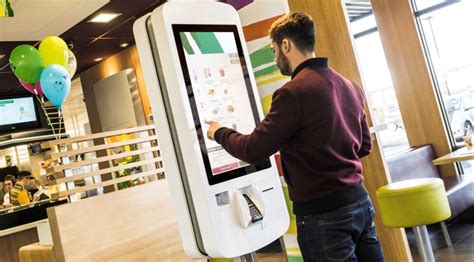The way businesses interact with customers has undergone a significant transformation in recent years. With the advent of artificial intelligence (AI), self-service kiosks have emerged as a game-changer in the realm of customer service. These kiosks are designed to provide customers with a seamless and efficient experience, enabling them to take control of their interactions with businesses.

The concept of self-service kiosks is not new, but the integration of AI has taken it to a whole new level. These kiosks are now equipped with advanced technologies such as facial recognition, voice recognition, and natural language processing (NLP). This enables them to provide customers with personalized experiences, answer complex queries, and even offer recommendations.
One of the primary benefits of self-service kiosks is the reduction in wait times. Customers no longer have to stand in long queues or wait for representatives to attend to them. With self-service kiosks, they can quickly and easily access the information they need or perform transactions without any human intervention.
How Self-Service Kiosks Work
Self-service kiosks are designed to be user-friendly and intuitive. Customers can interact with them using touch screens, voice commands, or even gestures. The kiosks are connected to the internet and can access a vast amount of data in real-time.
Here's a step-by-step explanation of how self-service kiosks work:
- Customer Approach: A customer approaches the self-service kiosk and initiates interaction.
- Authentication: The kiosk authenticates the customer using facial recognition, voice recognition, or other methods.
- Menu Options: The kiosk displays a menu of options for the customer to choose from.
- Selection: The customer selects the desired option and follows the prompts.
- Transaction: The kiosk processes the transaction or provides the requested information.
- Feedback: The kiosk provides feedback to the customer and offers additional options or recommendations.
Benefits of Self-Service Kiosks
Self-service kiosks offer numerous benefits to both customers and businesses. Some of the key advantages include:
- Reduced Wait Times: Self-service kiosks reduce wait times, enabling customers to quickly access information or perform transactions.
- Personalized Experience: AI-powered kiosks provide customers with personalized experiences, offering recommendations and answering complex queries.
- Increased Efficiency: Self-service kiosks automate routine tasks, freeing up staff to focus on more complex and high-value tasks.
- Cost Savings: Self-service kiosks reduce the need for human representatives, resulting in significant cost savings for businesses.
- Improved Customer Satisfaction: Self-service kiosks provide customers with a seamless and efficient experience, leading to improved customer satisfaction.

Industries That Can Benefit from Self-Service Kiosks
Self-service kiosks can be deployed in various industries, including:
- Retail: Self-service kiosks can be used in retail stores to provide customers with product information, enable self-checkout, and offer personalized recommendations.
- Healthcare: Self-service kiosks can be used in healthcare settings to provide patients with medical information, enable self-check-in, and offer personalized health advice.
- Finance: Self-service kiosks can be used in financial institutions to provide customers with account information, enable self-service transactions, and offer personalized investment advice.
- Travel: Self-service kiosks can be used in airports, train stations, and hotels to provide customers with travel information, enable self-check-in, and offer personalized travel recommendations.
Challenges and Limitations of Self-Service Kiosks
While self-service kiosks offer numerous benefits, they also present some challenges and limitations. Some of the key challenges include:
- Technical Issues: Self-service kiosks can be prone to technical issues, such as software glitches or hardware failures.
- Security Concerns: Self-service kiosks can be vulnerable to security breaches, such as hacking or data theft.
- Customer Resistance: Some customers may be resistant to using self-service kiosks, preferring to interact with human representatives instead.
- Maintenance and Support: Self-service kiosks require regular maintenance and support to ensure they are functioning correctly.

Future of Self-Service Kiosks
The future of self-service kiosks looks promising, with advancements in AI and machine learning set to further enhance their capabilities. Some of the key trends that are expected to shape the future of self-service kiosks include:
- Increased Adoption: Self-service kiosks are expected to become more widespread, with more businesses adopting them to improve customer experience and reduce costs.
- Advanced AI Capabilities: Self-service kiosks are expected to become more sophisticated, with advanced AI capabilities that enable them to provide more personalized and effective customer interactions.
- Integration with Other Technologies: Self-service kiosks are expected to be integrated with other technologies, such as virtual reality and augmented reality, to provide customers with more immersive and engaging experiences.
Conclusion
Self-service kiosks are revolutionizing the way businesses interact with customers. With their ability to provide personalized experiences, answer complex queries, and offer recommendations, they are set to become an essential tool for businesses looking to improve customer satisfaction and reduce costs. While there are challenges and limitations to consider, the benefits of self-service kiosks make them an attractive solution for businesses looking to stay ahead of the curve.







What is a self-service kiosk?
+A self-service kiosk is an interactive computer terminal that allows customers to access information, perform transactions, and interact with businesses without human intervention.
What are the benefits of self-service kiosks?
+Self-service kiosks offer numerous benefits, including reduced wait times, increased efficiency, cost savings, and improved customer satisfaction.
What industries can benefit from self-service kiosks?
+Self-service kiosks can be deployed in various industries, including retail, healthcare, finance, and travel.
